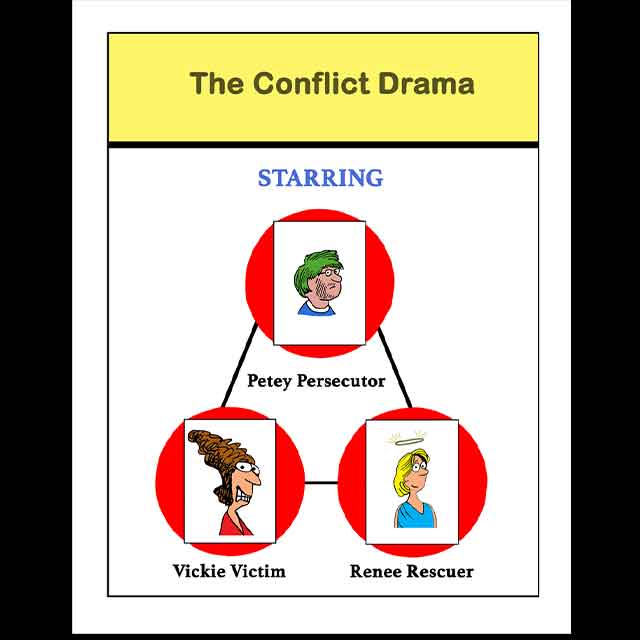In 1968, Stephen Karpman, M.D., developed what he called the “drama triangle”, containing three sides which he labeled victim, rescuer, and persecutor. Karpman’s “drama triangle” model is used in Healing Springs Ranch’s substance use therapy and is as relevant today as it was 51 years ago. The victim, rescuer, and persecutor are subconscious roles people play, to manipulate others.
Karpman describes the victim as a “poor me” character. A victim might see themselves as victimized, oppressed, powerless, helpless, hopeless, dejected, or ashamed, and can be extremely sensitive, needing extra “care” from those around him/her. A victim often denies responsibility for their circumstances and feel powerless over their ability to change those circumstances.
The rescuer, in Karpman’s model is characterized as the one that is compelled to freely “help fix” everything. A rescuer sees themselves as the caretaker of others, driven to help others feel good about themselves, often to their detriment.
Oh, the persecutor! Quick to judge and associate blame on others, a persecutor criticizes, blames, and holds others to unachievable expectations. The persecutor is oppressive, rigid, authoritative, angry, unpleasant, controlling and bullying with threats.
Sound familiar? You might not be one of the three yourself, but I bet you can recognize the drama triangle actors in the people you know. Understanding the propensity to go to the drama triangle is the first step. Learning to recognize the triangle and its parts, allow you to deal with the people who regularly “live” there.
Staying in your “wise mind” allows you to see clearly the regression into these roles, either in ourselves or in others. People fall back to what they know during times of stress or conflict and typically a person resorts to one or more parts of the drama triangle because the “roles” are familiar based on the conditioning they received from their family of origin. A wise mind is essential to make conscious choices in our relationships and social interactions.
How does the drama triangle play out in real life?
A victim always searches for a rescuer in their life. The victim seeks someone to save them and if that rescuer fails, the victim will quickly redefine them as a “persecutor’. A victim typically cannot make decisions, solve problems, feel joy, or understand that they are responsible for their sabotaging behaviors.
“The victim stance is a powerful one. The victim is always morally right, neither responsible not accountable, and forever entitled to sympathy.”-unknown
A rescuer is a classic co-dependent or enabler and must “help” their victim while diligently working to ensure they fail on their own. Often a rescuer will use guilt to keep a victim dependent and are often unsettled when they are not in the act of “rescuing”. Rescuers appear harried, overworked, and tired, acting as a martyr with loads of resentment towards their “victim” and life in general.
“A rescuer isn’t always a person. Addictions to alcohol or drugs, sexual addiction, workaholism- all the ways we numb out- can rescue the victim for feeling his or her own feelings”- David Emerald Womeldorff
Persecutors are inflexible and inhumane. Unable to be vulnerable, their biggest fear is becoming a victim themselves. Although persecutors yell, point fingers, and criticize, they never actually solve their problems.
“Martyrs and persecutors are the same type of man. As to which is the persecutor and which the martyr, this is only a question of transient power.”- Elbert Hubbard
Why is the drama triangle so powerful?
In life you will recognize that people (and maybe yourself) will cycle between all three drama roles, never stepping outside the of triangle. Victims must be “rescued”; rescuers must “save”; persecutors must “blame”. You may recognize these extreme versions or encounter milder versions of the drama triangle. Whether extreme or mild, the drama triangle becomes a continuum of people acting out their parts, unable to take responsibility of their part in perpetuating the triangle trap.
Healing Springs Ranch (HSR) uses the drama triangle model as well as many others in their recovery treatment. HSR wants you to experience holistic recovery and places an emphasis on getting to the underlying issues that led you to substance use in the first place. We’ll work with you to understand the “why” behind your addiction to help you overcome it.

